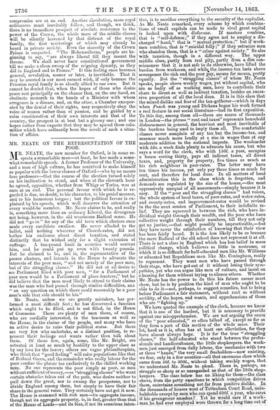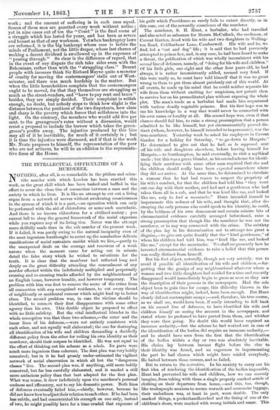MR. NEATE ON THE REPRESENTATION OF THE POOR.
MR. NEATE, the new member for Oxford, is in some re- spects a remarkable man—at least, he has made a some- what remarkable speech. A former Professor of the University, and a man of high culture, he has contrived to make himself so popular with the lower classes of Oxford—who by no means love professors—that the course of the election turned solely on his inclination to stand, and when at the eleventh hour he agreed, opposition, whether from Whigs or Tories, was at once at an end. The personal favour with which he is re- garded is due, no doubt, to his character, to his genial manner, and to his humorous tongue ; but the political favour is ex- plained by his speech, which well deserves the attention of every would-be member. Mr. Neate claims to be, and really is, something more than an ordinary Liberal, the divergence not being, however, in the old wearisome Radical sense. He did not " go in " for any of the old tests which electors once made every candidate swallow. He never alluded to the ballot, said nothing whatever of Church-rates, did not bother his audience about direct taxation, and stated distinctly that he wished only for a slight extension of suffrage. A ten-pound limit in counties would content him, and he could put up even with twenty pounds. But he claimed to be, and is, the representative of the poorer electors, and intends in the House to advocate the interests of tho poor man, " and not merely of the poor man, but of the strugglino. classes." He did not at all desire to see Parliament filled with poor men, " for a Parliament of poor men would be a Parliament of place-hunters," but he did believe that the man most likely to attend to their claims was the man who had passed through similar difficulties, ann " on any question on which there could reasonably be a poor man's side that side should be his."
Mr. Neute, unless we are greatly mistaken, has per- formed a most difficult feat ; he has discovered a function which ought to be filled, and is not filled, in the House of Commons. There are plenty of men there, of course, who are cordially interested, in the tea-room as well as the House, in the claims of the people, and many who have an active desire to raise their political status. But there are very few who undertake, as a distinct position, to re- present their feelings and wants rather than talk about them. Of those few, again, some, like Mr. Bright, are actuated at least as much by hostility to the upper class as by any love for the lower; others are vague philanthropists, who think that "good feeling" will raise populations, like that of.Bcthnal Green, and the remainder who really labour for the poor confine the phrase too exclusively to the skilled working man. No one represents the poor simply as poor, as men withoutsufficient of money,—as "struggling classes" who want certain obstacles taken out of the path, who desire neither to pull down the great, nor to swamp the prosperous, nor to divide England among them, but simply to have their fair share in the general voice. They certainly have not got it now. The House is crammed with rich men—its aggregate income, though not its aggregate property, is, in fact, greater than that of the House of Lords—and its bias, if not its conscious inten- tion, is to sacrifice everything to the security of the capitalist. As Mr. Neato remarked, every scheme by which combina- tions of small capitals can be made to rival great capital is looked upon with disfavour. If masters combine, that is "self-defence;" if they agree not to employ a dis- charged " hand," that is " mutual protection," but if work- men combine, that is "suicidal folly;" if they ostracize men who abandon them, that is a " crime against society." So also with taxation, though in a different way. The upper middle class partly from real pity, partly from a dim con- sciousness that it is not safe to do otherwise, have lifted the burden from workmen, and while/. the income-tax lasts above sevenpenee the rich and the poor pay, means for means, pretty equally. But the " struggling classes" of whom Mr. Neate speaks, people above weekly wages, yet without capital, who are as badly off as working men, have to contribute their share to direct as well as indirect taxation, besides an exces- sive proportion of all the local dues. It is in this class that the mixed dislike and fear of the tax-gatherer—which in days when Punch was young and Dickens began his work formed a real feature in our social literature—had its first exposition. To this day, among them all—there are scores of thousands in London—the phrase " rent and taxes" represents household disbursement in general, the heaviest and most inevitable of the burdens being used to imply them all. Tho comfortable classes never complain of any tax but the income-tax, and murmur much more loudly at a rise in wages than at any moderate addition to the national imposts. The woolcarder with 55s. a week finds plenty to advocate his cause, but who says a word for the clerk, who with 1501. a year, occupies a house costing thirty, pays all indirect taxes, all direct taxes, and, property for property, five times as much as his rich neighbour in poor-rates. The latter may have ten times his income, yet only pay three times as much for rent, and therefore for local dues. In all matters of local administration this is the class which is forgotten, and demands are regulated by the size of the house,—the most oppressively unequal of all assessments—simply because it is easy. If the " poor and the struggling classes had voices, the whole system of local taxes, of poor-rates, and water-rates, and county-rates, and improvement-rates would be revised in the the next session of Parliament, to their indefinite re- lief. They are squeezed in between the rich, who have in- dividual weight through their wealth, and the poor who have collective weight through their numbers,. till they not only get no justice,—that might possibly be impracticable,—but they have never the satisfaction of knowing that their view has been fairly heard. It is the less likely to be so because the mere Radical of the old school does not represent it at all. There is not a class in England which has less belief in mere political change, which believes so little in nostrums, or which it is so difficult for half-educated men like Mr. Williams or educated but Republican men like Mr. Coningham, really to represent. They want men who have passed through their stage, who have got out of it without losing their sym- pathies, yet who can argue like men. of culture, and insist on a hearing for them without trying to silence others. Whether Mr. Neate has the power to do this his future career must show, but he is by position the kind of man who ought to be able to do it—not, perhaps, to suggest remedies, but to bring before Parliament a fair statement, without rant as without acridity, of the hopes, and wants, and apprehensions of those who are "fighting up." We have quoted the example of the clerk, because we know that it is one of the hardest, but it is necessary to provide against one misapprehension. We are not arguina° the cause of the "poor, educated," so often talked of, except so far as they form a part of this section of the whole mass. Their lot, hard as it is, often has at least one alleviation, for they have almost always hope. It is for the true " struggling classes," the half-educated who stand between the profes- sionals and handicraftsmen, the little shopkeepers, the work- men just emerged from daily labour, the mechanics with two or three " hands," the very small freeholders—now existing, we fear, only in a few counties—all that enormous class which earns from 501. to 3001., without taking weekly wages, that we understand Mr. Neate to plead. There is, perhaps, no struggle so sharp or so unregarded as that of die little shop- keepers. The class below has no liking for them—the class above, from the petty exactions to which competition drives them, entertains something not far from positive dislike. In the thousands of houses west of Tottenham Court Road, unin- habitable except by men who can spend 6001. a year, who cares if his greengrocer smashes ? Yet he would care if a work- man he had ever employed were thrown for a long time out of work ; and the amount of suffering is in each case equal. Scores of these men are gazetted every week without notice ; yet in nine cases out of ten the " Court " is the final scene of a struggle which has lasted for years, and has been as severe and honest as that of any workman. Yet when bankruptcy laws are reformed, it is the big bankrupt whose case is before the minds of Parliament, not the little draper, whose last chance of making a decent dividend is swallowed up in the expenses of " passing through." So clear is the difference of regard, that in the event of any dispute the rich take sides even with the Bohemians, rather than with the "struggling class." Decent people with incomes think Sir Richard Mayne quite a monster of cruelty for moving the costermongers' stalls out of West- minster, and there was much hardship in the matter. But when the little householders complain that the costermongers ought to be moved, for that they themselves are struggling as much as the street-vendors, and 'have to pay rent and taxes " besides, they are simply derided. Their complaint is selfish enough, no doubt, but nobody stops to think how slight is the distance between the positions of the two disputants, how close and sharp is the poverty which forces that selfishness into the light. On the contrary, the members who would add five per cent. to the greengrocer's rates without a discussion, would resist a proposal to include the barrow which takes the green- grocer's profits away. The injustice produced by this bias may all of it be inevitable, for much of it certainly is ; but it is time the injustice were discussed, and if that is the work Mr. Neate proposes to himself, the representation of the poor who are not artisans, he will be an addition to the representa- tive force of the House.































 Previous page
Previous page